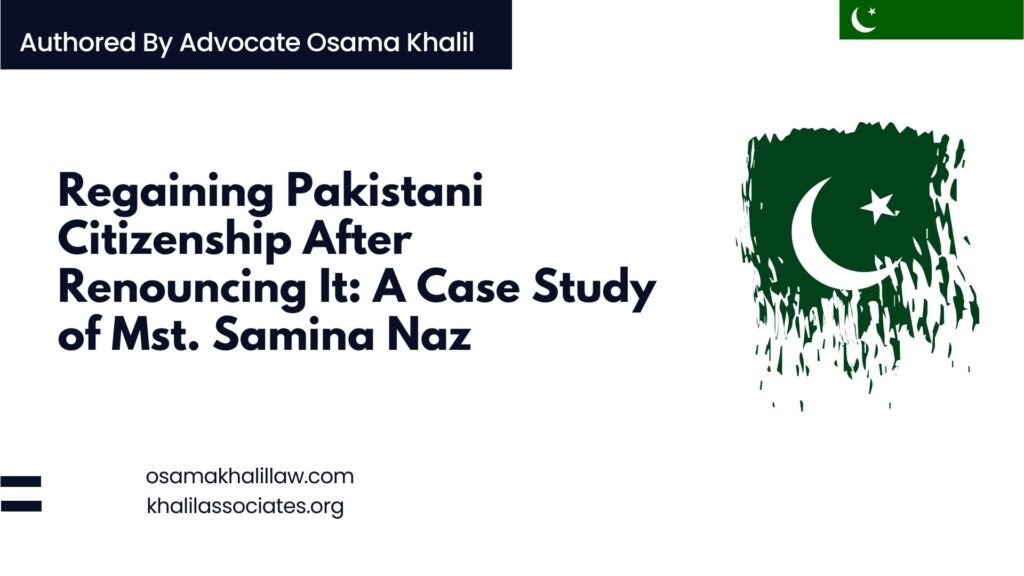
Mst. Samina Naz, a Pakistani woman, renounced her Pakistani citizenship in 2004 after marrying an Indian national. She later sought to regain her citizenship along with her children. This case revolves around the legal process of regaining Pakistani citizenship after renouncing it, highlighting the legal hurdles and requirements set by Pakistani law.
Renouncing Citizenship and the Challenges
When Mst. Samina Naz married her Indian husband, she renounced her Pakistani citizenship in 2004 and obtained Indian citizenship. According to the Pakistan Citizenship Act of 1951, if a Pakistani citizen takes another nationality, they automatically lose their Pakistani citizenship unless they meet specific conditions. Samina’s situation was complicated by her dual citizenship status, as she sought to regain Pakistani citizenship for herself and her children.
Pakistani Law on Renouncing and Regaining Citizenship
The Pakistan Citizenship Act of 1951 clearly defines the process for regaining citizenship after renunciation. Section 14(1) of the Act specifies that a Pakistani citizen who takes up another country’s nationality loses their Pakistani citizenship, unless they make a declaration renouncing the foreign nationality. However, Section 14(4) provides an exception for women married to foreign nationals, allowing them to retain their Pakistani citizenship.
In Samina’s case, despite her marriage to an Indian national, her renunciation of citizenship and the subsequent grant of Indian citizenship meant that she could not retain dual nationality. According to Pakistani law, after renouncing her Pakistani citizenship, Samina had to follow a strict process to regain it, which involved surrendering specific documents related to her Indian nationality.
The Role of the Ministry of Interior and Directorate General of Immigration
Samina Naz and her children applied to regain their Pakistani citizenship, but the Ministry of Interior and the Directorate General of Immigration and Passports required her to submit various documents, including her Indian citizenship certificate and the renunciation certificate of her Pakistani citizenship. The government’s position was clear: without the surrender of these documents, Samina could not be granted Pakistani citizenship.
The Legal Interpretation of the Case
Despite the law’s provisions for women married to foreign nationals, Samina’s case was different because she had formally renounced her Pakistani citizenship. The court emphasized that while women married to foreign nationals may not automatically lose their Pakistani citizenship, Samina’s situation, having voluntarily renounced her citizenship and acquired Indian nationality, was governed by different legal principles.
The Challenge for Samina’s Children
Samina’s children, born while she was a Pakistani citizen, faced an additional challenge. Under Section 5 of the Pakistan Citizenship Act, children born to Pakistani citizens automatically become citizens by descent. However, after Samina’s renunciation of citizenship, her children were no longer citizens of Pakistan. The law stipulated that her children could regain Pakistani citizenship through a declaration when they turned 21.
The Question of Dual Citizenship
A key issue in this case was the question of dual citizenship. Pakistan does not allow dual nationality, and the law made it clear that Samina could not hold both Indian and Pakistani citizenship. The court ruled that if Samina wanted to regain her Pakistani citizenship, she would first have to surrender her Indian citizenship. This was an important condition for her to become a Pakistani citizen again.
Court’s Decision: The Conditions for Regaining Citizenship
In the end, the court dismissed Samina’s petition, agreeing with the Ministry of Interior’s decision. The court found that the conditions set by the government for regaining citizenship were not unjust or arbitrary. The requirement to surrender certain documents, including the Indian citizenship certificate and passport, was lawful. The court also ruled that Samina’s children could not be granted Pakistani citizenship unless they met the legal requirements.
Conclusion
The case of Mst. Samina Naz highlights the legal process involved in regaining Pakistani citizenship after renouncing it. While Pakistani law offers some provisions for women married to foreign nationals, it also requires strict compliance with certain conditions, including the renunciation of foreign nationality. This case underscores the importance of understanding the legal framework surrounding citizenship in Pakistan and the need for individuals to meet the necessary requirements to regain their nationality.
Legal Assistance
For professional legal guidance and support in immigration matters, you may contact:
Mr. Osama Khalil
Lawyer & Legal Consultant
📞 Phone: 0316-1829946
📧 Email: contact@osamakhalillaw.com | contact@khalilassociates.org
